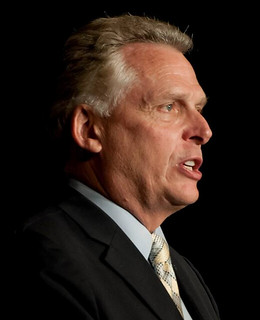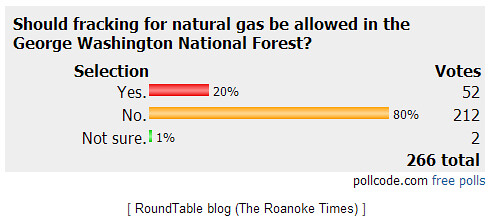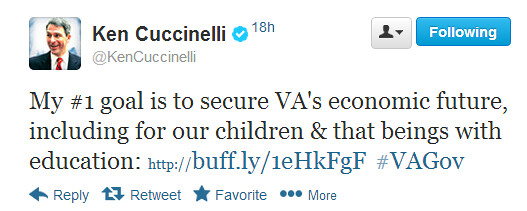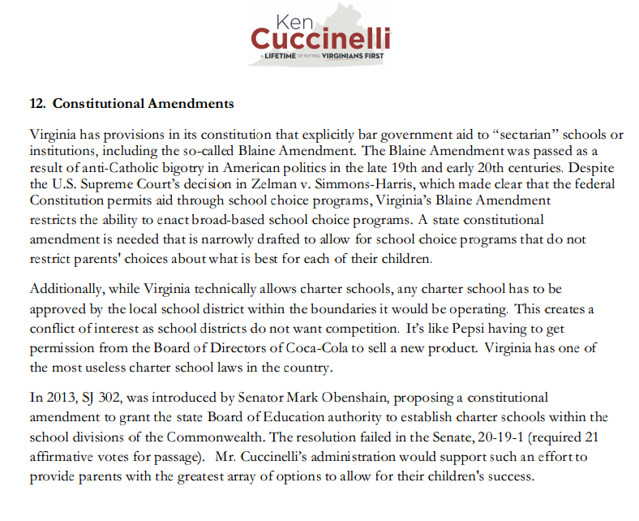McAuliffe Launches Plan to Protect VA’s Environment to Ensure Econ. Growth for Future Generations
 To put it mildly, Ken Cuccinelli and Terry McAuliffe differ when it comes to protecting Virginia's environment and natural resources. For starters, Cuccinelli denies climate science and pursues witch hunts against leading climate scientist, while going around bragging that he beat the EPA, as if that's a GOOD thing! Astounding. Meanwhile, Terry McAuliffe knows that protecting and conserving Virginia's environment and natural resources, like the Chesapeake Bay and GW National Forest, is not just good in and of itself, but will help Virginia's economy and protect the health of Virginians as well. Ken Cuccinelli has a diametrically different view, one driven by his fossil fuel friends like the Koch brothers, and this should be a major reason why you not only turn out on November 5 to vote for Democrats up and down the ballot, but also donate and volunteer to your favorite Virginia Democratic candidate. Now, here's Terry's plan:
To put it mildly, Ken Cuccinelli and Terry McAuliffe differ when it comes to protecting Virginia's environment and natural resources. For starters, Cuccinelli denies climate science and pursues witch hunts against leading climate scientist, while going around bragging that he beat the EPA, as if that's a GOOD thing! Astounding. Meanwhile, Terry McAuliffe knows that protecting and conserving Virginia's environment and natural resources, like the Chesapeake Bay and GW National Forest, is not just good in and of itself, but will help Virginia's economy and protect the health of Virginians as well. Ken Cuccinelli has a diametrically different view, one driven by his fossil fuel friends like the Koch brothers, and this should be a major reason why you not only turn out on November 5 to vote for Democrats up and down the ballot, but also donate and volunteer to your favorite Virginia Democratic candidate. Now, here's Terry's plan:
Virginia gubernatorial candidate Terry McAuliffe launched his platform to protect Virginia's environment and natural resources to ensure continued economic growth in Virginia on Thursday. The plan, Protecting Virginia’s Air, Water and Open Spaces, includes supporting water clean-up plans, working with localities to ensure adequate water supply, and protecting Virginia’s coastal communities to keep Virginians safe and ensure that the Commonwealth's economy continues to grow in future generations.
McAuliffe highlighted his proposal at George's Seafood Incorporated in Norfolk, where he discussed finding smart, effective ways to reduce pollution in Virginia's waters to make it easier for small fishermen and businesses in water industries to bring healthy catch to market.
"I am committed to working with stakeholders from all sides to find innovative was to protect our great natural resources and make sure our water industries remain drivers of economic growth in Virginia for years to come," said McAuliffe.
McAuliffe's full platform is below:
Protecting Virginia’s Air, Water, and Open Spaces
Conservation of our Commonwealth’s natural resources is a core responsibility of all Virginians and supports economic growth. Our Constitution obligates the Governor and the General Assembly to act as responsible stewards of Virginia’s environment. By protecting our natural resources, we defend the foundation of future economic growth and the long-term health of Virginians. As Governor, Terry will act in a responsible, bipartisan way to protect the Commonwealth’s precious resources for future generations of Virginians.
1. Restore Virginia’s streams, rivers, and the Chesapeake Bay. Thanks to the bipartisan work of lawmakers and non-profit organizations, a rigorous, science-based, multi-state program to truly clean up the Chesapeake Bay has been put together. The next four years are a crucial period for The Bay, which needs the support, advocacy, and leadership of the Commonwealth of Virginia if it is going to return to the economic, environmental, and recreational asset it can be.
a. Support localities’ water clean up plans. The Watershed Implementation Plans (WIPs) are the centerpiece of the plan to save the Bay. They are plans drawn up by localities in Virginia and other states to regulate the flow of pollutants into surrounding rivers and tributaries. Terry will direct the Department of Environmental Quality to engage and work side by side with these Virginia localities and representatives from the business community to help them implement their WIPs in an efficient and cost-effective way.
i. Indentify and promulgate best storm water management practices. Storm water run off is one of the most difficult and expensive parts of the Bay’s ecosystem to manage. Terry’s Administration will coordinate with localities to identify the most efficient and cost-effective methods of dealing with storm water.
b. Protect the Bay’s living resources. Fish and other living creatures of the Chesapeake are central to the economy and the livelihood of aquaculturists, watermen and recreational anglers. Virginia must enact innovative, science-driven strategies to manage these resources in a way that will sustain their populations for future generations. Successful bipartisan efforts to save the striped bass and blue crab populations are a good example of what we can accomplish when we work together.
c. Work with farmers to reduce agricultural run off. Farmers are the backbone of Virginia's economy. As Governor, Terry will support farmers in continuing, refining and expanding their efforts to make meaningful contributions to protecting the Commonwealth's rivers, streams and the Chesapeake Bay.
2. Preserve open space. Virginia’s natural beauty and open spaces are a crucial part of our identity. In order to preserve the natural and rural character of our Commonwealth, we need to continue the work of past administrations to protect open space.
a. Protect the land preservation tax credit. Virginia’s program of land preservation is routinely ranked as the best in the nation. As Governor, Terry will protect and promote the outstanding Land Preservation Tax Credit.
b. Preserve at least 400,000 acres of open space over four years. This pledge is the centerpiece of a bold, bipartisan agenda. Begun by Governor Kaine and continued by Governor McDonnell, this aggressive preservation of open land secures our environmental future for generations.
c. Prioritize publically accessible land. Where appropriate, land preserved by tax dollars should be publicly accessible. This may include innovative public/private partnerships to open new parks around the state.
d. Target preservation of environmentally sensitive areas. As Governor, Terry will seek to identify and prioritize the protection of Virginia's most environmentally valuable ecosystems, such as the wetlands.
3. Ensure adequate water supply and air quality. In order to ensure future economic growth, Virginia must guarantee a clean and stable source of water – groundwater and surface water – to businesses, farmers, and residents. Today, aquifers in many parts of the state are being drained faster than they are being refilled. We must work cooperatively with sister states to address this looming problem.
a. Engage localities in water planning. Terry will direct the Department of Environmental Quality to respond to dwindling aquifers by engaging localities in a comprehensive statewide process of water and drought planning.
b. Renew cooperation in interstate water use organizations. Water supply management is not a problem for Virginia alone. Any effective plan must involve the cooperation of our sister states through organizations like the Interstate Commission on the Potomac River Basin.
c. Implement water reuse strategies for industrial sites. As water becomes more scarce, industrial sites should be encouraged and incentivized, where appropriate, to make use of aggressive water recycling and treatment plans.
d. Work to protect air quality. Air quality is a national issue that by necessity has a national solution. Virginia should work cooperatively and proactively with sister states and federal regulators to do our part in solving this problem.
4. Sustainably manage Virginia’s mineral resources. Virginia is blessed with an abundance of mineral resources. A core responsibility of government is the careful management of these resources on behalf of all Virginians.
a. Ensure local control of fracking and horizontal drilling regulation. Localities that will deal with whatever costs and benefits may result from fracking and horizontal drilling should be encouraged to examine the issue and enact those rules that they believe will best serve their citizens. Terry will protect localities’ rights to make their own decisions about land use activities within their jurisdictions.
i. Oppose fracking and horizontal drilling in the George Washington Forest. The Commonwealth of Virginia is committed to protecting and managing the George Washington National Forest. Allowing fracking and horizontal drilling in this protected area is inconsistent with this commitment.
ii. Protect mineral rights of landowners. We have a responsibility to vigorously defend the rights of Virginia’s landowners. Terry will ensure that landowners are represented on the Virginia Gas and Oil Board.
b. Continue the moratorium on Uranium mining. A study by the National Academy of Sciences states Virginia would have to overcome "steep hurdles" before allowing mining and milling of the ore to ensure the safety of workers, the public, and the environment. Unless these hurdles can be cleared – and there has been no indication that they can be – the moratorium banning uranium mining should remain in place.
5. Act decisively to protect our coastal communities. It is a scientific reality that man-made climate change is causing sea levels to rise. It is a daily fact of life for Virginians living up and down the coast and it will have major impacts on billions of dollars’ worth of public and private infrastructure. We must act now to prevent decades of increasingly severe floods and natural disasters.
a. Convene a Climate Change Adaptation Commission. Terry will bring together a bipartisan commission of scientists, policy makers, conservationists, and industry representatives to proactively develop a comprehensive plan to protect Virginia’s communities from rising sea levels.
b. Draw on the expertise of Virginia’s university and college faculty. As Governor, Terry will encourage Virginia’s renowned network of universities and colleges to conduct research into the causes of and mitigation strategies for climate change.
c. Empower coastal localities. Mitigating the effects of climate change cannot be a one-size-fits all effort. As Governor, Terry will work with localities to give them the appropriate legal authority and find funding opportunities to enact local mitigation strategies.
d. Implement cutting edge surveying techniques. Part of mitigating sea level rise is having accurate data. The state government should take a lead role in identifying, prioritizing, and analyzing at-risk areas.
e. Coordinate with sister states. Recurrent flooding from sea level rise affects every coastal state. We should coordinate our efforts with our regional partners to identify best practices and share costs.
6. Preserve historic resources. Virginia’s rich and storied history gives us our unique place in the nation, forms part of our identity and draws tourists from around the world. We should take an active and cooperative approach to preserving these important monuments to our collective past.
a. Administer state and federal incentives for historic preservation. The Department of Historic Resources, with the cooperation of the federal government and local non-profits, has helped spur billions of dollars of private investment in historic preservation with strategic use of tax credits.
b. Ensure historic battlefields are protected. Significant portions of Virginia’s historic battlefields remain unprotected. The state should act in cooperation with localities and non-profits to coordinate their preservation.
c. Protect Virginia’s diverse heritage. The history of Virginia is the story of men and women from all walks of life and backgrounds. Our Commonwealth must celebrate their hard-won contributions.

 Here are a few Virginia (and national) news headlines, political and otherwise, for Thursday, August 15. As for the graphic, note that Virginia’s godawful energy policies are leaving our state in the dust when it comes to the boom in solar, wind, etc. So stupid — thanks Dominion, coal companies, Republicans, etc!
Here are a few Virginia (and national) news headlines, political and otherwise, for Thursday, August 15. As for the graphic, note that Virginia’s godawful energy policies are leaving our state in the dust when it comes to the boom in solar, wind, etc. So stupid — thanks Dominion, coal companies, Republicans, etc! I saw
I saw 






![Video: Rep. Abigail Spanberger (D-VA07) Rips Tulsi Gabbard Pick as “Extraordinarily Dangerous,” “Irresponsible”; Wonders “whether there might be any sort of effort [by foreign adversaries] at engaging or influencing her”](https://bluevirginia.us/wp-content/uploads/2024/11/spanbergergabbard-100x75.jpg)